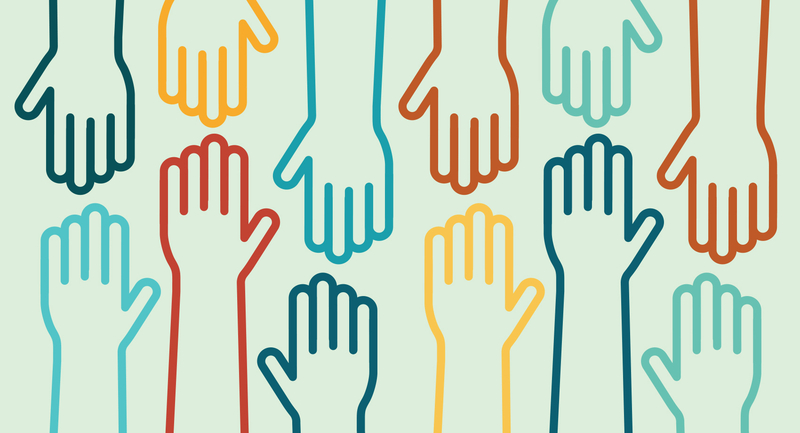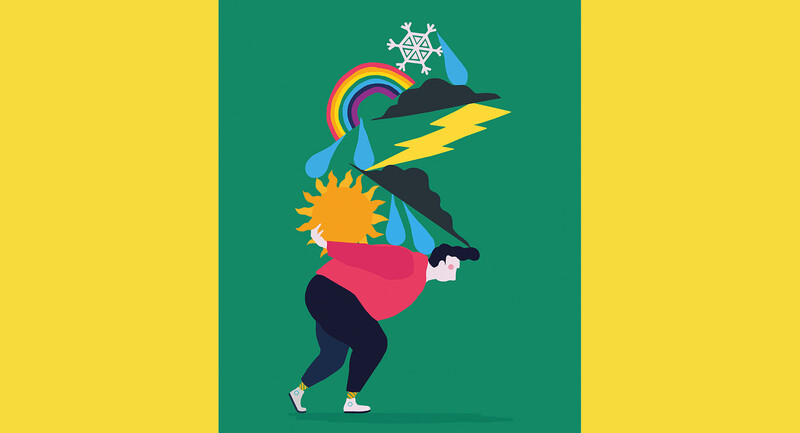If you grew up in the United States, you've probably heard of the popular childhood hand clapping game, Miss Mary Mack. (She was the one with the silver buttons and the elephants, remember?) What about Rockin' Robin, Gigolo, and Apple on a Stick? In African American communities, these and other hand games—a combination of rhyming verse and syncopated beats and gestures—represent a shared expression of black girlhood, says Tashira Halyard, cofounder of the D.C.-based Black Girls Hand Games Project.
"Hand games were a major factor in how we experienced the world as black girls," adds Halyard, a lawyer with a background in education and child advocacy. She and her Hand Games Project partner OnRaé LaTeal, a professional music producer and youth educator, discovered the widespread influence of games like Mary Mack with female friends near and far.
"There was this script that was the background of our lives, based on the games we played," says Halyard.
In the book, The Games Black Girls Play: Learning the Ropes from Double-Dutch to Hip-Hop, Kyra D. Gaunt notes that hand games are a way for black girls to "learn the 'rules' of black social identity and musical practice." Games often have a "melodic tune, or chanted lyrics, that resemble an approach to rapping not only prominent in hip-hop culture, but one that existed in African American music-making since slavery."
In fact, scholar Cornel West says kinetic and oral traditions like black girl hand games emerged as a "concrete, everyday response to institutionalized terrorism—slavery or Jim-Crowism" and a way to "survive and dream of freedom."
Black Girl Joy
Beyond back-in-the-day nostalgia, Halyard and LaTeal see hand games as an underused but potentially powerful tool to teach resiliency, connection, and safe touch. By casting familiar childhood games in a social-emotional learning frame, LaTeal and Halyard are working with communities to challenge biased perceptions of black girls as defiant, aggressive, and promiscuous.
To that end, Black Girls Hand Games Project presents one- to two-hour workshops (at schools, conferences, camps, and community events) steeped in social-emotional skill development. These workshops explore aspects of sisterhood and self-advocacy and culminate in small groups working together to develop their own variations on a traditional hand game remixed to a mainstream hip-hop beat. Think Migos meets Miss Mary Mack. Intergenerational groups of women and girls collaborate, communicate, and innovate to compose their original pieces, lifting one another up along the way.
"What's amazing is the power of hand games to transcend generational differences," says LaTeal. "We'll see middle schoolers stepping up as leaders in groups of women with advanced degrees because they know this is a safe, supportive space."
Stolen Youth
For Halyard and LaTeal, hand games are the embodiment of black girlhood and joy—experiences that can be in short supply for black girls today. "Everyone should have a banner of innocence over them in their childhood," says Halyard. Black girls, she notes, aren't afforded that opportunity and are "adultified."
"Seeing such a direct expression of joy, hearing the infectious laughter—you can't help but smile," adds Halyard. "Hand games enliven innocence and disrupt all these myths around black girlhood."
For example, a 2017 study from Georgetown Law (Girlhood Interrupted: The Erasure of Black Girls' Childhood) reports that adults view black girls as less innocent and more adult-like than their white peers, especially in the age range of 5–14 (see graph).
"We thought we might see two parallel lines and then an increase for black girls in high school," says Rebecca Epstein, the study's coauthor. "It's quite shocking that the greatest gap between perceptions of white and black girls is actually much earlier, in the tween years, when girls are forming their identities and these perceptions are likely to impact them much more."
The study, a pilot that Epstein hopes will launch into a more detailed and large-scale investigation of perceptions of black girlhood, revealed common misconceptions about black girls. Specifically, black girls are perceived as knowing more about sex and needing less support, nurturing, and protection than their white peers. This "adultification" bias toward black girls creates a domino effect that informs how they are treated in school and by law enforcement agencies. Researchers like Monique Morris, the author of Pushout: The Criminalization of Black Girls in Schools, and Ashley Smith, at the University of Wisconsin–Madison, draw a direct line between these biased beliefs and the way schools discipline and refer black girls to law enforcement at higher rates. In 2015–16, black girls comprised only 8 percent of national school enrollment but 14 percent of all school suspensions, and they were almost three times more likely to be referred to juvenile justice than white girls.
The same faulty lens that harshly disciplines black girls as adults also inappropriately sexualizes them as adults. Social justice advocacy group Black Women's Blueprint reports that 60 percent of black girls experience sexual assault before they are 18, a rate much higher than their white peers. That's why teaching safe touch is a core tenet of the work Black Girls Hand Games Project does.
"I have my own personal stories about being little and understanding that the boys who were trying to touch me inappropriately were wrong," says Halyard. "We want to teach the principles of safe touch young and have our girls understand that connecting with your peers consensually, hand-by-hand, making eye contact, is safe. That is what sisterhood feels like. When it goes outside those norms, that's when it's inappropriate, and you have the right to stand up and say, 'No.'"
Girlhood Claps Back
Forced to choose between being stereotyped as jezebel or angry black feminist, "black girls do not get to be girls and their behavior is more likely to be criminalized," Smith noted during her presentation at the 2018 American Education Research Association (AERA) conference. One young girl Smith worked with summed up the experience of black girls in school: "When I talk in class, I get in trouble." Added Candice Valenzuela, a University of San Francisco teacher educator who was a panelist alongside Smith, in schools, "black girls are forced to be small and punished when they take up space."
To make up for systemic erasures of black girl experiences, "we need to create spaces for black girls to tell their stories and experiences of black girlhood," Smith argues. Through improvisation, syncopation that hinges on connection and cooperation, and embodied musical performance, the Black Girls Hand Games Project is taking that step. The project is working on an album of hand game remixes, all by women artists; they've begun offering beat-making and music production demos for girls; and they're working on building capacity to offer workshops as a series or semester-long learning experience.
"We're trying to change the master narrative around black girls being loud, mean, promiscuous, and defiant," says Halyard. "We want to flip that question of, 'What is wrong with you?' to 'What has happened to you?' and provide the platform for black girls to speak with their own voices." Likewise, Georgetown Law's Center on Poverty and Inequality has launched the Trauma-Informed Schools Learning Network for Girls of Color as a space for youth-advised resources to better serve girls of color in school.
"Don't let 'black girl magic' become a slogan that masks the needs of black girls," says Tiffani Marie Johnson, an educator at University of California at Berkeley. "Just because we have magic in us doesn't mean we don't need support."
Connect with the Black Girls Hand Games Project on Instagram @handgamesproject or by email at handgamesproject@gmail.com.








